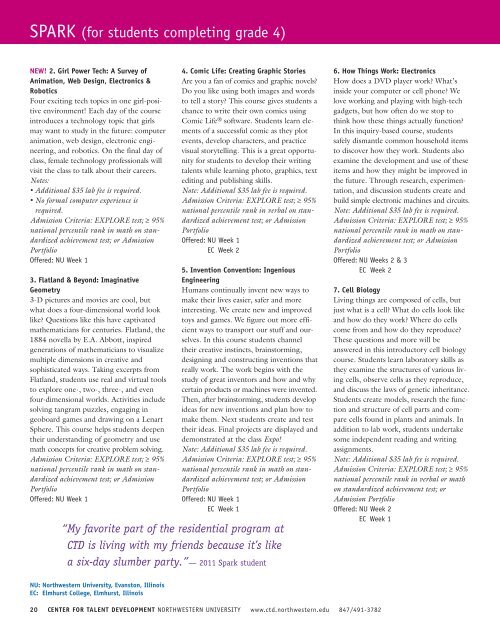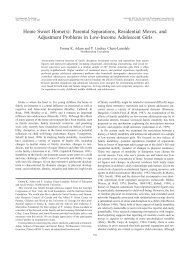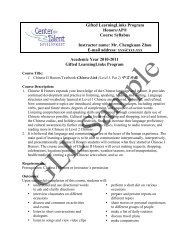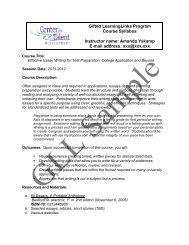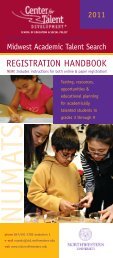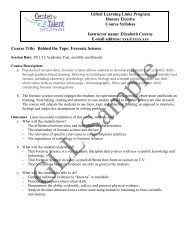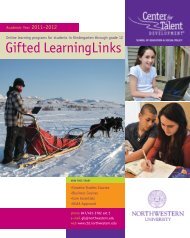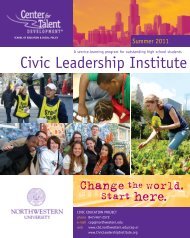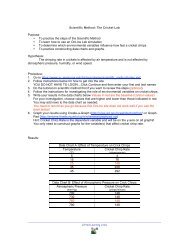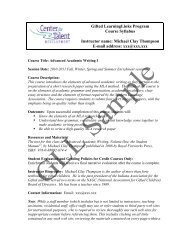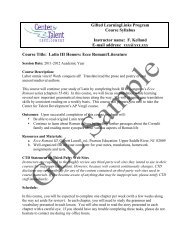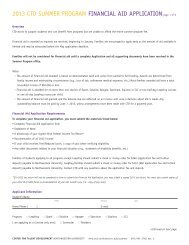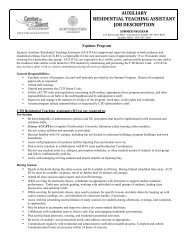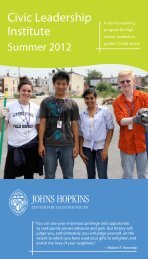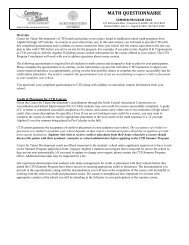2012 Summer Program - Center for Talent Development ...
2012 Summer Program - Center for Talent Development ...
2012 Summer Program - Center for Talent Development ...
- No tags were found...
Create successful ePaper yourself
Turn your PDF publications into a flip-book with our unique Google optimized e-Paper software.
SPARK (<strong>for</strong> students completing grade 4)NEW! 2. Girl Power Tech: A Survey ofAnimation, Web Design, Electronics &RoboticsFour exciting tech topics in one girl-positiveenvironment! Each day of the courseintroduces a technology topic that girlsmay want to study in the future: computeranimation, web design, electronic engineering,and robotics. On the final day ofclass, female technology professionals willvisit the class to talk about their careers.Notes:• Additional $35 lab fee is required.• No <strong>for</strong>mal computer experience isrequired.Admission Criteria: EXPLORE test; ≥ 95%national percentile rank in math on standardizedachievement test; or AdmissionPortfolioOffered: NU Week 13. Flatland & Beyond: ImaginativeGeometry3-D pictures and movies are cool, butwhat does a four-dimensional world looklike? Questions like this have captivatedmathematicians <strong>for</strong> centuries. Flatland, the1884 novella by E.A. Abbott, inspiredgenerations of mathematicians to visualizemultiple dimensions in creative andsophisticated ways. Taking excerpts fromFlatland, students use real and virtual toolsto explore one-, two-, three-, and evenfour-dimensional worlds. Activities includesolving tangram puzzles, engaging ingeoboard games and drawing on a LenartSphere. This course helps students deepentheir understanding of geometry and usemath concepts <strong>for</strong> creative problem solving.Admission Criteria: EXPLORE test; ≥ 95%national percentile rank in math on standardizedachievement test; or AdmissionPortfolioOffered: NU Week 14. Comic Life: Creating Graphic StoriesAre you a fan of comics and graphic novels?Do you like using both images and wordsto tell a story? This course gives students achance to write their own comics usingComic Life ® software. Students learn elementsof a successful comic as they plotevents, develop characters, and practicevisual storytelling. This is a great opportunity<strong>for</strong> students to develop their writingtalents while learning photo, graphics, textediting and publishing skills.Note: Additional $35 lab fee is required.Admission Criteria: EXPLORE test; ≥ 95%national percentile rank in verbal on standardizedachievement test; or AdmissionPortfolioOffered: NU Week 1EC Week 25. Invention Convention: IngeniousEngineeringHumans continually invent new ways tomake their lives easier, safer and moreinteresting. We create new and improvedtoys and games. We figure out more efficientways to transport our stuff and ourselves.In this course students channeltheir creative instincts, brainstorming,designing and constructing inventions thatreally work. The work begins with thestudy of great inventors and how and whycertain products or machines were invented.Then, after brainstorming, students developideas <strong>for</strong> new inventions and plan how tomake them. Next students create and testtheir ideas. Final projects are displayed anddemonstrated at the class Expo!Note: Additional $35 lab fee is required.Admission Criteria: EXPLORE test; ≥ 95%national percentile rank in math on standardizedachievement test; or AdmissionPortfolioOffered: NU Week 1EC Week 1“My favorite part of the residential program atCTD is living with my friends because it’s likea six-day slumber party.”— 2011 Spark student6. How Things Work: ElectronicsHow does a DVD player work? What’sinside your computer or cell phone? Welove working and playing with high-techgadgets, but how often do we stop tothink how these things actually function?In this inquiry-based course, studentssafely dismantle common household itemsto discover how they work. Students alsoexamine the development and use of theseitems and how they might be improved inthe future. Through research, experimentation,and discussion students create andbuild simple electronic machines and circuits.Note: Additional $35 lab fee is required.Admission Criteria: EXPLORE test; ≥ 95%national percentile rank in math on standardizedachievement test; or AdmissionPortfolioOffered: NU Weeks 2 & 3EC Week 27. Cell BiologyLiving things are composed of cells, butjust what is a cell? What do cells look likeand how do they work? Where do cellscome from and how do they reproduce?These questions and more will beanswered in this introductory cell biologycourse. Students learn laboratory skills asthey examine the structures of various livingcells, observe cells as they reproduce,and discuss the laws of genetic inheritance.Students create models, research the functionand structure of cell parts and comparecells found in plants and animals. Inaddition to lab work, students undertakesome independent reading and writingassignments.Note: Additional $35 lab fee is required.Admission Criteria: EXPLORE test; ≥ 95%national percentile rank in verbal or mathon standardized achievement test; orAdmission PortfolioOffered: NU Week 2EC Week 1NU: Northwestern University, Evanston, IllinoisEC: Elmhurst College, Elmhurst, Illinois20 CENTER FOR TALENT DEVELOPMENT NORTHWESTERN UNIVERSITY www.ctd.northwestern.edu 847/491-3782


